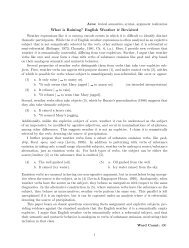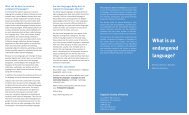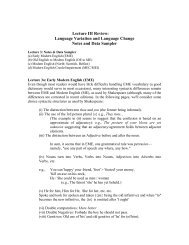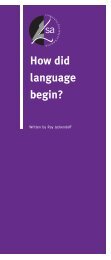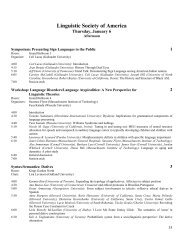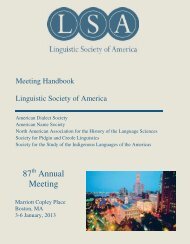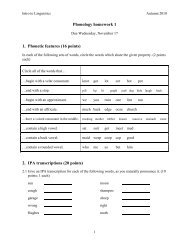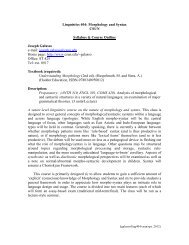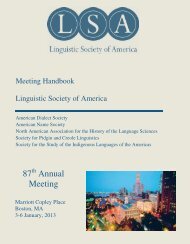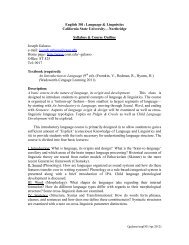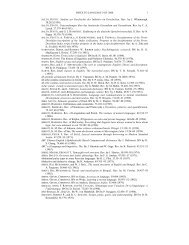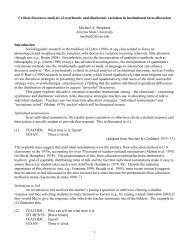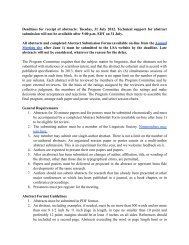Part 1: Thursday, 4 JanuaryPart 2: Friday, 5 JanuaryPart 1: California C, 7:30 – 9:00 PMPart 2: California C, 9:00 AM – 12:00 PMPhonology: An Appraisal <strong>of</strong> <strong>the</strong> Field in 2007Organizers: Larry M. Hyman, University <strong>of</strong> California-BerkeleyEllen Kaisse, University <strong>of</strong> WashingtonParticipants:Abigail C. Cohn (Cornell University)Bruce Hayes (University <strong>of</strong> California, Los Angles)Paul Kiparsky (Stanford University)Donca Steriade (Massachusetts Institute <strong>of</strong> Technology)Five phonologists discuss <strong>the</strong> current state <strong>of</strong> phonology from <strong>the</strong>ir different perspectives. Part 1, a one and a half hour plenary,previews <strong>the</strong> symposium presentations and allows <strong>the</strong> assembled LSA membership to hear and contribute to <strong>the</strong> discussion. Thepresentations in Part 2 treat <strong>the</strong> advent and implications <strong>of</strong> laboratory phonology, <strong>the</strong> extent to which different phonological <strong>the</strong>oriesaid in phonological description, new views <strong>of</strong> <strong>the</strong> relationship between phonology and morphology, and <strong>the</strong> possibility <strong>of</strong> abandoningcertain classical idealizations in phonology. Each discussant gives a presentation with time for questions after each. A 30-minuteaudience and panel discussion concludes Part 2.Abigail C. Cohn (Cornell University)The framing <strong>of</strong> laboratory phonology & <strong>the</strong>oretical phonology & <strong>the</strong> influence <strong>of</strong> early generative <strong>the</strong>oryI attempt to address two questions: (1) <strong>the</strong> relationship between generative phonology and its descendents and laboratory phonology,and (2) <strong>the</strong> ways in which assumptions in early generative <strong>the</strong>ory have defined and delineated <strong>the</strong> fields <strong>of</strong> phonetics and phonology.With regard to <strong>the</strong> first, I consider what led to <strong>the</strong> codification <strong>of</strong> ‘laboratory phonology’ (LabPhon) in <strong>the</strong> mid-1980s. At <strong>the</strong> outset,<strong>the</strong> central goals <strong>of</strong> LabPhon included framing issues in terms <strong>of</strong> a richer way <strong>of</strong> investigating phonology and reconciling phonologicaland phonetic approaches to <strong>the</strong> investigation <strong>of</strong> human sound systems. LabPhon was seen as an enrichment or complement to<strong>the</strong>oretical phonology; now, it is seen by many as an alternative. I consider this shift in light <strong>of</strong> <strong>the</strong> evolution <strong>of</strong> generative phonology(broadly defined), as optimality <strong>the</strong>ory has become <strong>the</strong> dominant paradigm in <strong>the</strong>oretical approaches to phonology in North <strong>America</strong>.This more juxtapositional stance is consistent with recent trends whereby <strong>the</strong>re is increased polarization and fragmentation in terms <strong>of</strong>how we talk about and how we do phonology. In <strong>the</strong> second part <strong>of</strong> <strong>the</strong> paper, I suggest that this polarization is counterproductive to<strong>the</strong> goals <strong>of</strong> reaching a deeper understanding <strong>of</strong> <strong>the</strong> nature <strong>of</strong> human sound systems as part <strong>of</strong> human cognition and human behavior.In highlighting <strong>the</strong> differences, we lose sight <strong>of</strong> how much <strong>of</strong> a shared agenda we have in our investigations. We need to understandhow we frame both assumptions and models and how this framing affects our investigations. I consider how an interwoven set <strong>of</strong>assumptions <strong>of</strong> early generative <strong>the</strong>ory, framed in Chomsky (1965) Aspects <strong>of</strong> <strong>the</strong> <strong>the</strong>ory syntax and o<strong>the</strong>r seminal work, have shapedour <strong>the</strong>ories and our approaches to linguistic investigation. These include: <strong>the</strong> definition <strong>of</strong> <strong>the</strong> ideal speaker/hearer within ahomogeneous speech community; <strong>the</strong> separation <strong>of</strong> competence and performance; <strong>the</strong> importance <strong>of</strong> modularity and <strong>the</strong> avoidance <strong>of</strong>redundancy; and <strong>the</strong> nature and source <strong>of</strong> language universals, and <strong>the</strong> implications for <strong>the</strong> nature <strong>of</strong> <strong>the</strong> task <strong>of</strong> language acquisition. Iargue that in large measure <strong>the</strong>se assumptions are approximately correct, but not in <strong>the</strong> literal sense in which <strong>the</strong>y are <strong>of</strong>ten interpreted.If we can unpack and rethink <strong>the</strong>se assumptions, we will be able to move away from a polarized discourse and come to understand <strong>the</strong>ways in which <strong>the</strong>se assumptions are useful and <strong>the</strong> ways in which <strong>the</strong>y are not. To move forward, we need to be willing to questionour most cherished assumptions, and we need to be willing to move away from a polarized discourse about <strong>the</strong> right <strong>the</strong>ory. We cangain new insight into some <strong>of</strong> <strong>the</strong> central questions before us through a more syn<strong>the</strong>tic and collaborative mindset.63
Bruce Hayes (University <strong>of</strong> California, Los Angeles)Phonological <strong>the</strong>ory: Finding <strong>the</strong> right level <strong>of</strong> idealizationEvery scientific field must find <strong>the</strong> right level <strong>of</strong> idealization at which to work. In phonology, four kinds <strong>of</strong> idealization are widelyadopted. (1) Data workers <strong>of</strong>ten abstract away from free variation, recording only <strong>the</strong> most frequent phonetic form for any particularword. (2) Analysts idealize across <strong>the</strong> lexicon, identifying <strong>the</strong> patterns <strong>of</strong> alternation that are most frequent and analyzing only <strong>the</strong>se.(3) The question <strong>of</strong> how to identify and analyze patterns in paradigms is reduced to a narrower question, that <strong>of</strong> how to derive all <strong>the</strong>members <strong>of</strong> a paradigm from a single underlying representation <strong>of</strong> its stem. (4) Analysts give <strong>the</strong>mselves carte blanche to explore <strong>the</strong>range <strong>of</strong> analyses permitted under a <strong>the</strong>ory, making <strong>the</strong> tacit assumption that some <strong>the</strong>ory <strong>of</strong> <strong>the</strong> future will explain how <strong>the</strong> chosenanalysis could be discovered by children learning <strong>the</strong> language. I do not mention <strong>the</strong>se idealizations in order to scorn <strong>the</strong>m; in fact, Ithink <strong>the</strong>y have been extremely useful, enabling <strong>the</strong> development <strong>of</strong> insightful and sophisticated phonological <strong>the</strong>ories that will serveus well as we seek to extend our understanding. However, <strong>the</strong> choice <strong>of</strong> idealizing assumptions is never made a priori, and maturingfields <strong>of</strong>ten find it useful to try to account for <strong>the</strong>ir data in less idealized form. In phonology, current work is exploring what might bedone by abandoning <strong>the</strong> four idealizations just mentioned. My overall conclusion is that with accumulating <strong>the</strong>oretical progress, <strong>the</strong>idealizations that were made in <strong>the</strong> infancy <strong>of</strong> our field may no longer be necessary. Aiming higher, we can hope to develop our<strong>the</strong>ories in ways that are both more sophisticated and more responsive to data.Larry M. Hyman (University <strong>of</strong> California, Berkeley)Phonological <strong>the</strong>ory & description: Is <strong>the</strong>re now a gap?I consider <strong>the</strong> relationship between phonological <strong>the</strong>ory and phonological description, addressing questions like: What has it been?What is it now? What should it be? I suggest that while <strong>the</strong>re should ideally be a symbiotic relationship between <strong>the</strong> two, <strong>the</strong>re arereasons for concern. Although <strong>the</strong>re is nothing incompatible between <strong>the</strong>ory and description (which are sometimes even hard todisentangle), certain recent trends have encouraged <strong>the</strong>oretically-minded phonologists to turn away from ‘deep’ (e.g.morphophonemic) description <strong>of</strong> phonological systems. It is easy to demonstrate <strong>the</strong> impact <strong>of</strong> successive movements in 20th centuryphonology on <strong>the</strong> descriptive work <strong>of</strong> <strong>the</strong>ir time: Structuralist phonemics, classical generative phonology, nonlinear phonology,lexical phonology, and prosodic domain <strong>the</strong>ory have all provided concepts and tools that have informed and facilitated phonologicaldescription. The question is whe<strong>the</strong>r current <strong>the</strong>ories do this as well. Most <strong>of</strong> my attention is on optimality <strong>the</strong>ory, which has had animpact well beyond phonology. Much <strong>of</strong> <strong>the</strong> current research in phonological OT can be conveniently grouped into two efforts: (1)work addressing (<strong>of</strong>ten problematic) issues which arise as <strong>the</strong> result <strong>of</strong> certain basic assumptions <strong>of</strong> <strong>the</strong> <strong>the</strong>ory; (2) application <strong>of</strong> <strong>the</strong><strong>the</strong>ory to what it does best. Theoretical goals as well as technological advances have also stimulated computational andpsycholinguistic work. The question is whe<strong>the</strong>r <strong>the</strong> OT revolution has been as useful to descriptive phonology as prior frameworks. Isuggest it has not been, largely because <strong>of</strong> its turning away from questions <strong>of</strong> (underlying) representation and its focus on surfaceoutputs. Those who attempt to apply OT to deep description will find that <strong>the</strong>re is a ‘too many analyses problem’ that makes it hard toconfidently proceed with <strong>the</strong> same kind <strong>of</strong> argumentation that was prevalent <strong>of</strong> descriptive work in pre-OT generative phonology.Instead, OT has adopted a kind <strong>of</strong> self-conscious universalism that, from <strong>the</strong> point <strong>of</strong> view <strong>of</strong> <strong>the</strong> individual phonological system, isnot particularly description-friendly. I discuss reasons why <strong>the</strong>re may for <strong>the</strong> first time now be a gap between phonological <strong>the</strong>ory anddescription.Paul Kiparsky (Stanford University)Description & explanation: English revisitedLike SPE and autosegmental and metrical phonology, OT has raised important new why-questions and provided answers to many <strong>of</strong><strong>the</strong>m. But while those earlier <strong>the</strong>oretical advances also made <strong>the</strong> practice <strong>of</strong> descriptive phonology easier, OT has made it harder.However robust a phonological generalization may be, we can't incorporate it into an OT grammar until we understand how to deriveit from ranked universal constraints. The difficulty <strong>of</strong> producing reasonably comprehensive and perspicuous phonologicaldescriptions under this regime no doubt accounts for some <strong>of</strong> <strong>the</strong> continuing resistance to OT. This raising <strong>of</strong> stakes has <strong>the</strong> virtue <strong>of</strong>forcing better explanations but also leads in practice to <strong>the</strong> narrowing <strong>of</strong> <strong>the</strong> empirical domain. I revisit SPE-type analyses <strong>of</strong> Englishphonology and ask what insights <strong>of</strong> <strong>the</strong>m OT salvages, how it improves on <strong>the</strong>m, and what it is forced to give up. I argue that stratalOT can capture what is right about <strong>the</strong>m.64
- Page 1: MEETING HANDBOOKLINGUISTIC SOCIETY
- Page 5 and 6: Meeting RoomsSECOND FLOORFOURTH FLO
- Page 7: • LSA: Business Meeting and Award
- Page 11 and 12: LSAThursday, 4 JanuaryEveningWelcom
- Page 13 and 14: Friday MorningLSAConstructions and
- Page 15 and 16: LSAFriday, 5 JanuaryAfternoonInvite
- Page 17 and 18: Friday AfternoonLSAModeling Acquisi
- Page 19 and 20: LSARules for Motions and Resolution
- Page 24 and 25: LSASaturday AfternoonSymposium: Par
- Page 26 and 27: LSASaturday AfternoonSyntactic Face
- Page 28 and 29: LSASunday MorningFirst Language Acq
- Page 30 and 31: American Dialect SocietyThursday, 4
- Page 32 and 33: ADSSaturday, 6 JanuaryMorningSessio
- Page 34 and 35: American Name SocietyThursday, 4 Ja
- Page 36 and 37: ANSFriday AfternoonForms of Address
- Page 38 and 39: ANSSaturday AfternoonHistorical Ono
- Page 40 and 41: Society for Pidgin and Creole Lingu
- Page 42 and 43: SPCLSaturday, 6 JanuaryMorningSpeci
- Page 44 and 45: Society for the Study of the Indige
- Page 46 and 47: SSILAFriday AfternoonPhonology and
- Page 48 and 49: SSILASunday, 7 JanuaryMorningSemant
- Page 52 and 53: Donca Steriade (Massachusetts Insti
- Page 54 and 55: Friday, 5 JanuaryPlenary AddressCal
- Page 56: Saturday, 6 JanuaryPresidential Add
- Page 59 and 60: Thursday, 4 JanuaryTutorialA Field
- Page 61 and 62: Thursday, 4 JanuarySymposiumContinu
- Page 63 and 64: Friday, 5 JanuarySymposiumApproache
- Page 65 and 66: Friday, 5 JanuaryDigital Poster Ses
- Page 67 and 68: Stephen R. Anderson (Yale Universit
- Page 69 and 70: David Bowie (University of Central
- Page 71 and 72: Sharon Peperkamp (CNRS/University o
- Page 73 and 74: Elena Guerzoni (University of South
- Page 75 and 76: Claire Bowern (Rice University)Morp
- Page 77 and 78: Lise Dobrin (University of Virginia
- Page 79 and 80: We discuss the analysis of the vowe
- Page 81 and 82: Brian Agbayani (California State Un
- Page 83 and 84: squiggly shapes). Disfluency made n
- Page 85 and 86: Adam Baker (University of Arizona)
- Page 87 and 88: final particle; this structure enco
- Page 89 and 90: Travis G. Bradley (University of Ca
- Page 91 and 92: demonstrated that 2-year-olds map n
- Page 93 and 94: Nancy J. Caplow (University of Cali
- Page 95 and 96: Sarah Churng (University of Washing
- Page 97 and 98: Jennifer Culbertson (Johns Hopkins
- Page 99 and 100: Scott Drellishak (University of Was
- Page 101 and 102:
Marc Ettlinger (University of Calif
- Page 103 and 104:
Scherre 2001 argue that the phenome
- Page 105 and 106:
Cynthia A. Fox (University at Alban
- Page 107 and 108:
structures to the double object con
- Page 109 and 110:
Steven Gross (East Tennessee State
- Page 111 and 112:
Heidi Harley (University of Arizona
- Page 113 and 114:
equivalents. I argue that their sim
- Page 115 and 116:
predictable, and/or restricted in d
- Page 117 and 118:
Keith Johnson (University of Arizon
- Page 119 and 120:
Andrew Kehler (University of Califo
- Page 121 and 122:
comparative rate of acquisition acr
- Page 123 and 124:
Pei-Jung Kuo (University of Connect
- Page 125 and 126:
EunHee Lee (University at Buffalo,
- Page 127 and 128:
Brook Danielle Lillehaugen (Univers
- Page 129 and 130:
Martha J. Macri (University of Cali
- Page 131 and 132:
Spanish subjects with unaccusative
- Page 133 and 134:
Brad Montgomery-Anderson (Universit
- Page 135 and 136:
multi-ethnic configuration, and pos
- Page 137 and 138:
Natalie Operstein (University of Ca
- Page 139 and 140:
Nick Pharris (University of Michiga
- Page 141 and 142:
Anastasia Riehl (Cornell University
- Page 143 and 144:
Françoise Rose (CNRS-IRD) Session
- Page 145 and 146:
precedence also constrains stative
- Page 147 and 148:
use experimental and corpus techniq
- Page 149 and 150:
eads easily for astrophysicists.).
- Page 151 and 152:
domains of use are mostly complemen
- Page 153 and 154:
show that both concatenative and no
- Page 155 and 156:
Don Walicek (University of Puerto R
- Page 157 and 158:
positions. However, certain matrix
- Page 159 and 160:
Suwon Yoon (University of Chicago)



